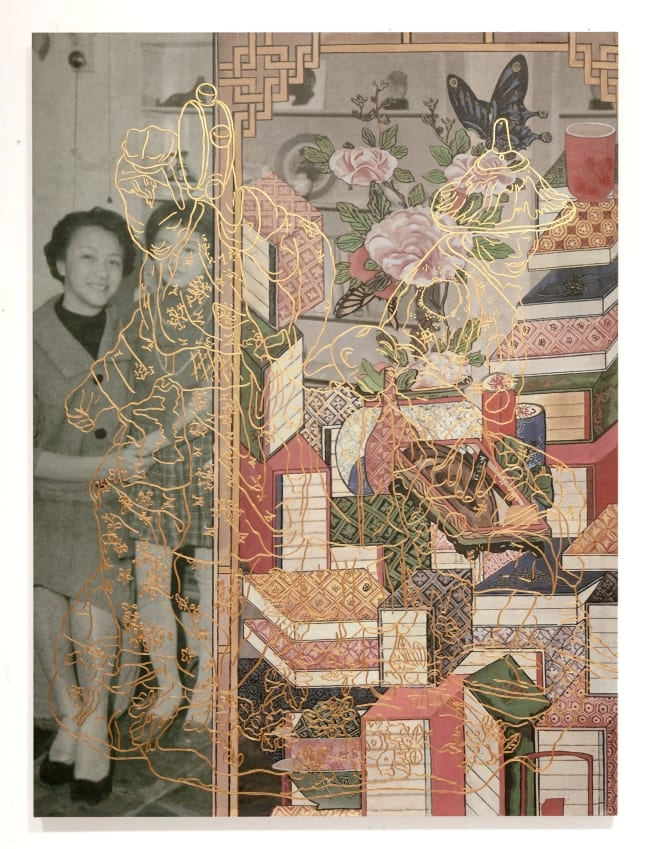Kyungmi Shin
On Still Life
February 8 – March 22, 2025


Kyungmi Shin
On Still Life
February 8 – March 22, 2025
Various Small Fires is proud to present a solo show of new work by gallery artist Kyungmi Shin. This is the Los Angeles-based artist’s third exhibition with VSF and first in the Texas gallery. Combining archival imagery with intricately hand painted elements, Shin reflects on the commodification and transplanting of culture between East and West.
In these works, Shin examines the role of still life painting in shaping cultural exchange and its ability to expose the colonial, economic, and geographic relationships that have influenced the aesthetics of Europe, the Americas, and Asia. Shin presents her Korean heritage twofold: through mining her family’s photographic archive and by presenting Korean Chaekgeori paintings, an 18th and 19th century still life practice that features imported objects from the West and China. She opposes the Chaekgeori paintings with Dutch still lifes, the European standard of excellence that often highlights imported Chinese porcelain objects. Line paintings of European Chinoiserie veil the myriad imagery of Shin’s compositions, adding yet another layer reflecting the movement of ideas across continents and oceans.
Shin’s engagement with opacity is a powerful tool that suggests fluid demarcations of time and place. This is expertly showcased in the exhibition’s largest work, many stories (2025): a Sepia tone photograph depicting a group of men fades behind a grid of graphic Chaekgeori paintings while a silver line painting of Chinoiserie-style branches and birds floats to the front of the work’s picture plane. On Still Life also exhibits the artist’s first tondo paintings, layering Dutch still life paintings of citrus in porcelain bowls with the graphic line paintings of Korean still lifes. These circular compositions further emphasize the portal-like nature of Shin’s paintings, transporting viewers into realms where past and present converge.
Kyungmi Shin (b. 1963, South Korea, lives and works in Los Angeles, California) received an MFA from UC Berkeley, CA (1995). Working with painting, sculpture, and photography, Shin explores various histories, identities and migrations by interrogating colonial, capitalist and religious global expansion and its effect. Shin has presented works at Craft Contemporary Museum, Los Angeles; Sperone Westwater, New York; Kalamazoo Institute of Art; Jeffrey Deitch, Los Angeles; Galerie Marguo, Paris; Orange County Museum of Art, California; The Berkeley Art Museum, California; Art Sonje Center, Seoul; Japanese American National Art Museum, Los Angeles; and Torrance Art Museum, California. Shin has received numerous grants including California Community Foundation Grant, Durfee Grant, Pasadena City Individual Artist Fellowship and City of Los Angeles Master Artist Grant (COLA). Her work is part of the permanent collections at the Los Angeles County Museum of Art, Getty Center, and the Berkeley Art Museum and Pacific Film Archive. She has completed over 20 public artworks, and her most recent public work was installed at the Intuit Dome in Inglewood, CA (2024).
Lezley Saar (b. 1953 Los Angeles, lives and and works in Los Angeles) was born to artist parents Richard and Betye Saar. Saar’s works include paintings, drawings, book-works, photography, banners, collages, dioramas, and installations. Her various series, “The Atheneum,” “Anomalies,” “Mulatto Nation,” “Tooth Hut,” “Autist’s Fables,” “Madwoman in the Attic,” “Monad,” “Gender Renaissance,” “A Conjuring of Conjurors,” and “Black Garden,” deal with notions of identity, race, gender, beauty, mysticism, sanity, and normalcy. She has held solo exhbitions at Various Small Fires, Seoul, South Korea; Walter Maciel Gallery, Los Angeles; California African American Museum, Los Angeles; Merry Karnowsky Gallery, Los Angeles; Kravets/Wehby Gallery, New York; and David Beitzel Gallery, New York. Recent group exhibitions include The Wende Museum, Culver City; Rena Bransten Gallery, San Francisco; McNay Art Museum, San Antonio, Texas; Koplin Del Rio, Los Angeles; and Roberts & Tilton, Los Angeles. Saar is in the public collection at the Los Angeles County Museum of Art; Museum of Contemporary Art, Los Angeles; The Studio Museum in Harlem, New York; The Museum of Fine Arts, Houston, Texas; The Kemper Museum of Contemporary Art, Kansas City, Missouri; California African American Museum, Los Angeles; Ackland Art Museum, Chapel Hill, North Carolina; The Crocker Art Museum, Sacramento, California; The Hessel Museum of Art, Annandale-on-Hudson, New York; and the Santa Barbara Museum of Art, California.
Various Small Fires (Dallas)
1511 Commerce Street
Dallas, 75201 Texas
214.250.0940
hours: tuesday – saturday: 11am-7pm